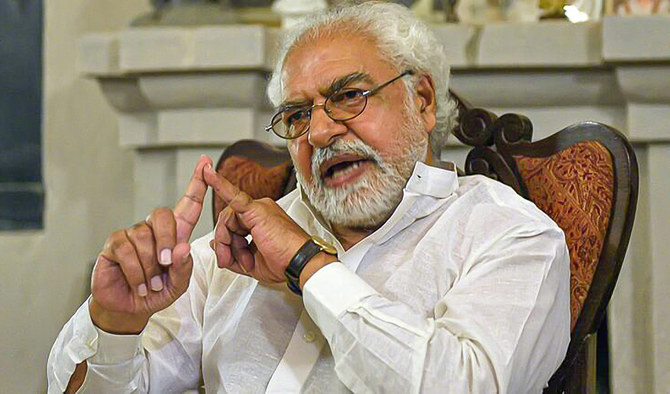ISLAMABAD: A Pakistani court on Tuesday freed Ayaz Amir, a well-known columnist and politician, in a case related to the murder of his daughter-in-law in which the chief suspect is his son, Amir’s lawyer said.
Pakistani police arrested the veteran journalist on Sunday for allegedly aiding his son, Shanawaz, in last week’s murder of Sarah Inam at a farmhouse in Islamabad.
Inam, a 37-year-old economist and a Canadian national of Pakistani origin, had wed Shahnawaz around three months ago. The murder took place a day after Inam returned from Abu Dhabi where she worked.
Shahnawaz, the prime accused in the case, is still in police custody after being arrested from the crime scene early Saturday. Media reported that Inam’s immediate family, based in Canada, had arrived in Pakistan on Monday night to pursue the case.
“In today’s hearing, I inquired from the prosecution what evidence it had against my client,” Amir’s lawyer, Basharatullah Khan, told Arab News.
Khan said the police were keeping his client in custody without any evidence and the court had “discharged” him after reviewing the record.
At Monday’s hearing, Amir had told the judge that he was “traumatized” by the murder.
“I had informed the police about the incident and even guided them to the farmhouse where the murder took place,” the journalist said.
According to the first information report, Shahnawaz’s mother had called the police on September 23 and informed them that her son had murdered his wife “with a dumbbell.”
Inam’s murder is reminiscent of last year’s headline-grabbing murder of Noor Mukadam, 27, which drew an outpouring of anger over femicides in the South Asian nation.
In March this year, a Pakistani court sentenced to death Pakistani-American Zahir Jaffer, a childhood friend of Mukadam, for beheading her. Mukadam and Jaffer were widely believed to have been in a romantic relationship, which they had broken off a few months before her murder.
Hundreds of women are killed in Pakistan every year, while thousands more suffer brutal violence. But few cases receive sustained media attention, and only a small fraction of perpetrators are ever punished or convicted by courts.
But Mukadam’s shocking murder, involving members of the privileged elite of Pakistani society, triggered an explosive reaction from women’s rights activists reckoning with pervasive violence.
It also increased pressure for a swift conclusion of the trial in a country known to have a sluggish justice system and where cases typically drag on for years.
















